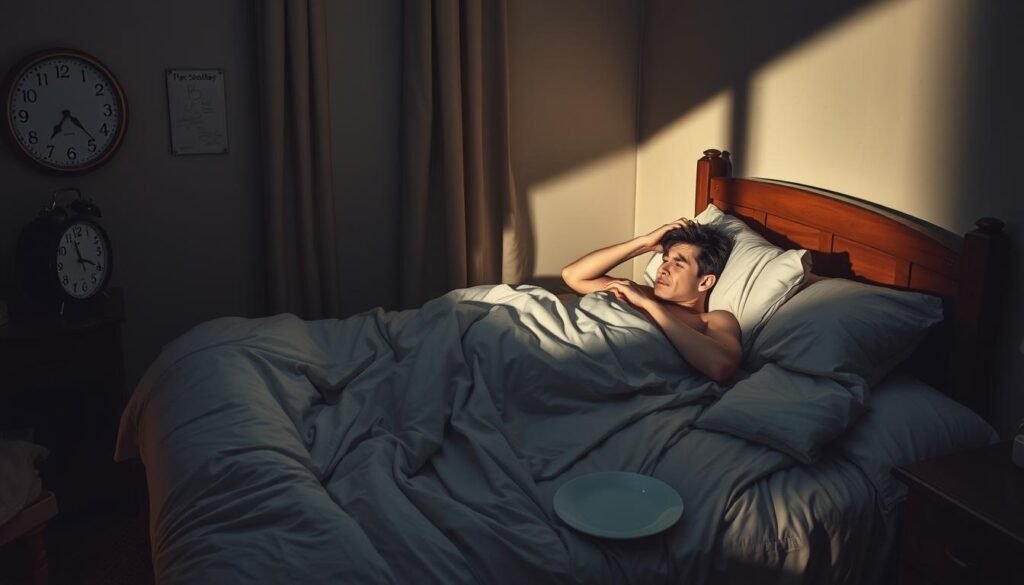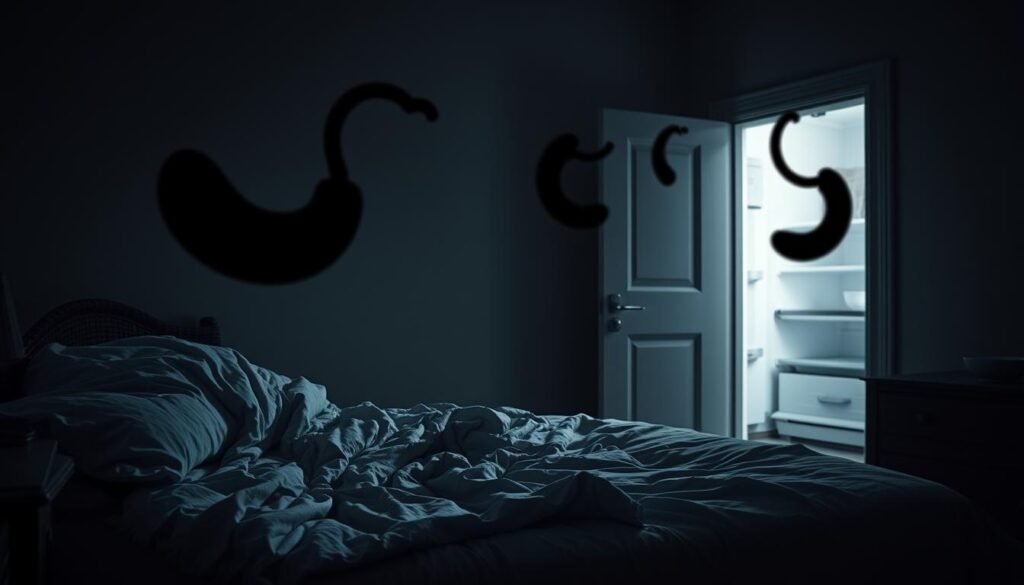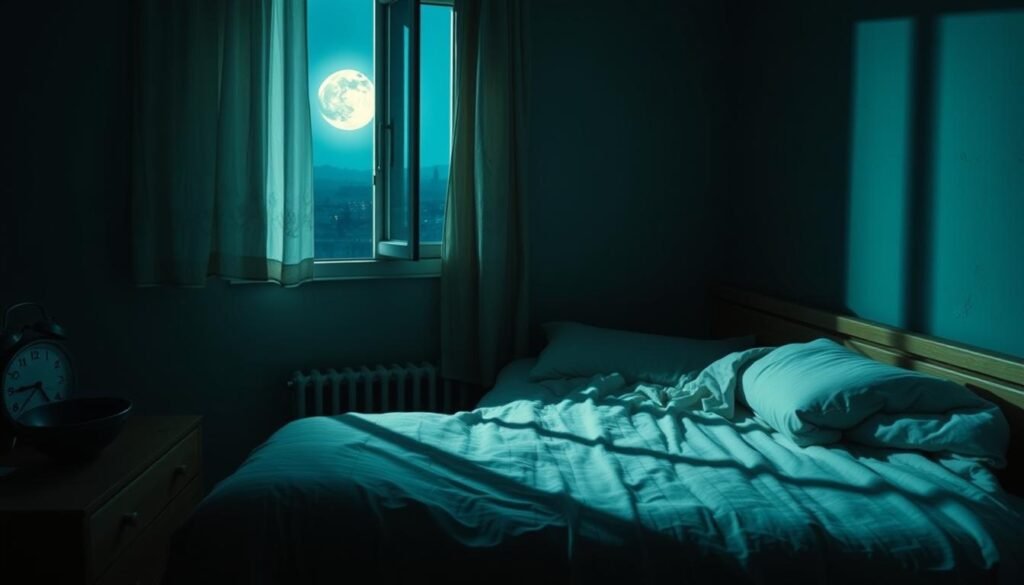Is going to bed hungry a hidden reason for insomnia? This question is central as nearly 70% of Americans face sleep problems. Hunger affects sleep more than just making you uncomfortable. It mixes with both body and mind issues, making sleeping well hard. We’ll explore how hunger at night impacts sleep and insomnia. This is important with today’s diet trends and food security issues.
Key Takeaways
- Up to 35% of adults in the U.S. experience short sleep duration.
- Going to bed hungry can disrupt sleep quality and patterns.
- Eating too close to bedtime can lead to poorer sleep outcomes.
- Balance in meal timing is essential for managing sleep health.
- Addressing food insecurity is key to improving overall sleep quality.
Understanding Hunger and Its Effects on Sleep
Learning how hunger impacts sleep sheds light on the importance of our diet. About 70% of Americans struggle with sleep issues, and half of them suffer from insomnia. Hunger can mess with how well we sleep, mainly because it triggers hormonal changes.
Link Between Hunger and Sleep Quality
Hunger affects sleep by messing with important hormones like leptin and ghrelin. Leptin tells our brain we’re full, and ghrelin makes us feel hungry. Lack of sleep can make ghrelin levels go up, making us feel hungrier and disrupting our sleep. Having a small snack before bed could help balance these hormones and improve sleep.
Hormonal Responses: Leptin and Ghrelin
It’s important to keep leptin and ghrelin in check to sleep better. Eating carbs before bed increases tryptophan, which helps us fall asleep. Opt for a small snack, like cheese or peanut butter, at night. But avoid heavy meals and caffeine, like chocolate and some sodas, four hours before bed.
People worried about sleep and hunger should look into nutrition assistance programs. They can be very helpful, especially when it’s hard to get food.
Why People Go to Bed Hungry
People go to bed hungry for different reasons, including choice and need. Some choose to eat less to lose weight. Others cannot find enough food, which affects their health.
Dieting and Caloric Restrictions
Many people diet to look better or be healthier. This can make them lose weight but also feel hungry. Feeling hungry can make them choose bad food, starting a cycle of poor nutrition.
Food Insecurity and Malnutrition
Food insecurity is a big problem affecting lots of people, especially now. It can make you unable to find enough food, leading to bad sleep. Not having enough nutrients can make this worse, making it hard to sleep well. Solving food insecurity helps people sleep and feel better.
Can Going to Bed Hungry Cause Insomnia
Understanding the link between hunger and sleep is key if you struggle with sleep. Asking, “Can going to bed hungry lead to insomnia?” is important. Studies link hunger with sleep problems. They show hunger can cause disturbances in sleep. This leads to staying awake longer once you fall asleep. It reveals a strong connection between hunger impacting sleep quality and insomnia risk.
Research Insights on Sleep Disruptions
The American Time Use Survey shows a link between hunger before bed and sleep quality. When people go to bed hungry, they often have trouble sleeping. Eating unhealthy, high-calorie snacks late can hurt sleep. It’s better to choose healthier snacks at night to improve sleep.
Unhealthy late-night meals can disrupt sleep. They can keep you awake and harm your sleep health. Opting for a light and nutritious snack instead is a good idea.
Impact of Hunger on Sleep Patterns
Hunger can cause restlessness and trouble sleeping. If you’re often hungry at bedtime, it’s hard for your body to relax. Eating healthy snacks like vegetables with hummus or Greek yogurt at night may help. But, stop eating three hours before bed to avoid digestive problems.
It’s important to manage your daily calories to not feel hungry at night. Not eating enough before bedtime can raise the risk of insomnia. What and when you eat truly matters for sleep.

The Connection Between Late Night Hunger Pangs and Sleep
Late night hunger can make it hard to sleep well. It causes short sleep and tired mornings. This can lead to a cycle of sleepless nights.
Effects of Hunger on Sleep Duration
Hunger affects how well we sleep. It can lead to broken sleep cycles. This disrupts our body’s clock.
Going to bed hungry can cause midnight awakenings. This is due to body reactions and hormone changes. Not eating enough in the day can cause night cravings and poor sleep.
Behavioral Factors Contributing to Nighttime Hunger
Some habits lead to hunger at night. When and what we eat matters a lot. For instance, snacking late and food habits can increase nighttime hunger.
Watching how many calories you eat helps control late hunger. It’s vital to balance your daily energy needs. Recognizing these habits is key for those struggling with sleep. Learn why this is important.

Exploring Empty Stomach Insomnia
Empty stomach insomnia can really mess with your sleep. If you’re hungry, you might feel your stomach growl or cramp. This can make it super hard to chill out and fall asleep. So, being hungry can keep you from catching those Z’s.
Physical Discomfort from Hunger
When you’re dealing with empty stomach insomnia, hunger can physically bother you. You might deal with stomach noises or slight cramps. These issues can mess with your sleep. If you don’t eat, this problem might lead to regular insomnia. It shows why listening to your body and eating something before bed is key.
Mental Associations with Being Hungry
Your thoughts about being hungry also impact your sleep. Worrying about not eating enough or not having food can stress you out. These thoughts can keep your mind busy and stop you from relaxing. It’s crucial to understand these connections to handle hunger’s effect on sleep better.
Keeping a schedule for eating might help those with empty stomach insomnia. By eating regularly, you can avoid some issues caused by being hungry. For more on how eating affects sleep, check into intermittent fasting and sleep.

Foods That Promote Better Sleep If You’re Hungry
If you’re lying awake because you’re hungry, picking the right snacks is key. Some foods have nutrients that help with sleep. For instance, tryptophan aids in making serotonin. Choosing carefully can quell your hunger and not mess up your sleep.
Examples of Sleep-Inducing Snacks
Here are some snacks to try for better sleep:
- Kiwi: Eating two kiwis before bed can help you fall asleep faster and sleep better.
- Tart Cherries: Tart cherry juice might help you sleep longer and more soundly.
- Malted Milk: Malted milk before sleeping could lessen wake-ups during the night.
- Fatty Fish: Having salmon thrice a week improves sleep and how you feel in the daytime.
- Nuts: Almonds, walnuts, pistachios, and cashews are good as they have melatonin, omega-3s, magnesium, and zinc for sleep.
- Rice: Eating rice regularly is better for sleep than bread or noodles.
- Carbohydrates: Foods with a high glycemic index, eaten about four hours before bed, can help with sleep.
What to Avoid Before Bedtime
Avoiding certain things before bed is crucial. Steer clear of these:
- Sugary Beverages: They can worsen sleep quality.
- High-Caffeine Foods: These disrupt your natural sleep rhythm.
- Heavy or Rich Foods: These might make you uncomfortable at night.
Picking the right evening snacks helps fight off hunger and improves sleep. This leads to a healthier night-time routine.
| Food | Benefit |
|---|---|
| Kiwi | Faster sleep onset and improved quality |
| Tart Cherry Juice | Increases total sleep time and efficiency |
| Malted Milk | Reduces sleep interruptions |
| Salmon | Supports better sleep and daytime functioning |
| Almonds | Provides melatonin and magnesium |
| Rice | Associated with improved sleep |
| Pistachios | Contains high levels of melatonin |
| Carbohydrates | Aids in falling asleep |
Personal Eating Habits That Affect Sleep
What we eat is key to how well we sleep. Eating at the right times through the day affects our nighttime rest. By eating healthy, we can enjoy deeper sleep.
Timing of Meals and Their Importance
Eating times have a big impact on sleep. Large meals late at night can make falling asleep hard. Eating too close to bedtime can cause bloating and mess with our sleep. It’s best to stop eating two hours before going to bed. Also, avoid caffeine six hours before bed to sleep better.
Daily Caloric Distribution for Better Sleep
How we spread out our calories during the day matters for good sleep. Meals with protein, fiber, and healthy fats are best. Eating foods low in fiber and high in saturated fats can ruin sleep quality. Include many fruits, vegetables, and whole grains to boost health and improve sleep. Eating well during the day helps avoid cravings for sugary or fatty foods at night. Having regular, well-balanced meals prevents hunger at night, leading to better sleep.
| Meal Timing | Effects on Sleep |
|---|---|
| Early Evening | Promotes better digestion and sleep onset |
| Late Night | Increases discomfort and sleep disruptions |
| Two Hours Before Bed | Improves sleep quality by allowing proper digestion |
| Regular Meal Times | Helps regulate circadian rhythms, leading to better sleep |
Practical Tips to Avoid Nighttime Hunger
Finding ways to manage nighttime hunger can boost sleep quality. Healthy eating routines and nutrient-rich foods help reduce cravings. These tips may lead to restful nights.
Establishing Healthy Eating Routines
Regular meal schedules keep energy levels even during the day. Eating more calories in the morning may lower obesity risks. Not eating too close to bedtime aids in digestion and curbs late-night hunger.
It’s recommended to stop eating three hours before bedtime. This helps avoid discomfort and promotes better sleep.
Incorporating Nutrient-Rich Foods
Nutrient-rich foods are key to controlling nighttime hunger. High-protein meals help lessen cravings significantly. Fruits, nuts, and vegetables are healthy snacks that add nutrients and keep you full without too many calories.
Choosing these foods can prevent unhealthy eating spurts that increase calorie intake. It’s a good step towards healthier eating habits.
Adding fiber-rich foods to your diet helps you feel full and reduces cravings. Evening activities like yoga or reading can take your mind off food. This supports better nighttime habits.
Conclusion
Going to bed hungry can affect your sleep, causing problems like insomnia. Late-night snacks may disturb sleep and can lead to health risks. It’s important to eat right to sleep well.
Eating dinner early helps your body digest before bed. A small snack, like cheese and crackers, can prevent hunger at night. Stay away from caffeine and junk food to avoid sleep problems.
To sleep better, balance what and when you eat. Choosing the right meals and snacks can improve your sleep. Good nutrition is key for a restful night.